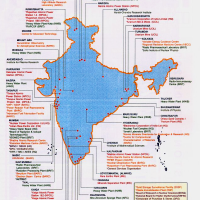Nandini Sundar July 04, 2013
On July 5 2011, a Bench of Justice B Sudershan Reddy and Justice SS Nijjar of the Supreme Court delivered what is widely regarded as a landmark judgement, banning Salwa Judum by any name, and disbanding and disarming special police officers (SPOs) who had been responsible, along with security forces, for many human rights violations.
The only activity that the erstwhile SPOs would be permitted was traffic and disaster management, and that too, only if they were innocent of any crimes.
The court ordered that criminal investigations and prosecutions be initiated in Chhattisgarh. Earlier that year, they had also directed that the security forces vacate all schools and ashrams, with the aim of restarting schools in the villages.
The Bench asked the CBI to investigate the March 2011 rapes, murder and arson in Tadmetla and neighbouring villages and subsequent events in which Swami Agnivesh was attacked while trying to deliver relief.
As Justice Reddy (now retired) said in a recent interview, had the Supreme Court’s orders been implemented, perhaps the May 25 attack could have been avoided. However, far from obeying the court, the governments in Chhattisgarh and the Centre have done everything possible to flout the order.
The Union of India attempted to have the order overturned through a review petition, but succeeded only in having it limited to Chhattisgarh. The government of Chhattisgarh responded by renaming all the SPOs, ‘armed auxiliary forces’ with effect from the date of the judgement, and giving them automatic weapons and higher salaries.
Schools are still occupied, no prosecutions have taken place, no victims of the violence perpetrated by Salwa Judum have received any compensation, and the CBI enquiry is still incomplete.
The CBI first visited Tadmetla in January 2012. In February, the Maoists killed one of the former SPOs, Kartam Surya, who had been accused of rape, and whom the state had been staunchly defending inside and outside court.
The SPOs then physically attacked the CBI team. They have now decided to conduct their enquiry out of Jagdalpur. In May this year, the villagers travelled 400 km to depose, including old men and breastfeeding mothers, leaving aside their annual tendu patta earnings.
The state government continues to stall all mention of a joint monitoring committee led by eminent independent persons, which alone can ensure that FIRs are registered, compensation given and some degree of normalcy restored.
In March 2012, the petitioners filed a contempt petition. There have been 13 listings since, but not one hearing. On six occasions, we sat in court but the matter was not heard because other cases before it took up all the time.
The matter was adjourned four times because despite asking and being given a ‘non-miscellaneous day’ by the court, the listing branch of the Supreme Court assigned it to a miscellaneous day. (Tuesdays to Thursdays are non-miscellaneous days, where matters can be heard properly while Mondays and Fridays are frenzied because a large number of fresh matters are considered for admission).
On three occasions, when everything was right — it was a non-miscellaneous day and our turn had come — Chhattisgarh’s counsel bought time on technicalities.
The only people to have benefitted from the Supreme Court litigation so far are the SPOs and the lawyers for the Chhattisgarh government, who have made lakhs in fees for delaying justice to starving adivasis.
Chhattisgarh’s litigation strategy is also to keep filing affidavits with the same data, but under different annexure numbers, in order to mislead the court. On the other hand, the lawyers for the petitioners, Ashok Desai and Nitya Ramakrishnan and their juniors, have put in years of pro-bono work (seven years already and still counting), at considerable personal cost.
Sumita Hazarika as the advocate on record (AOR) has gracefully filed endless affidavits. Our co-petitioner Kartam Joga suffered two-and-a-half years in jail on false charges, before being acquitted earlier this year.
My years of court observation have instilled an enormous respect for the judges whose daily workload involves reading voluminous briefs and listening to a series of complicated matters.
There has to be a system which is less cruel to them, as well as to PIL lawyers and ordinary litigants, such as more reliance on written documents and limited time for arguments, as is the case in other countries.
No litigant from outside Delhi can afford to keep coming for hearings. And no adivasis on their own could afford to fight such battles in the Supreme Court.
The security forces killed 25 innocent villagers, including several children, in two separate attacks — Sarkeguda in June 2012 and Edesmetta in May. The Maoists kidnapped Alex Menon, the district collector of Sukma, in March 2012, and killed 27 Congress leaders and workers in May.
Unless there is a breakthrough of some kind, there is no prospect of peace. Implementing court orders will not resolve everything but justice goes much further than anything else.
What is surprising is not that adivasis support the Maoists against the police. What is inspiring is how adivasis continue to believe in justice, to send letters to the court, to attend CBI hearings.
Hope is the hardest thing to extinguish in the human heart, and justice is the gossamer thread that binds people to the State.
Nandini Sundar is a litigant in the Salwa Judum case
The views expressed by the author are personal
Related articles
- #India – Salwa Judum’s record: 99 allegations of rape, not a single FIR (kractivist.wordpress.com)
- Salwa Judum rape accused acquitted as victims turn hostile #Vaw (kractivist.wordpress.com)
- Press Release- AID Condemns the Violent Attack in Chhattisgarh (kractivist.wordpress.com)
- The continuing tragedy of the adivasis (kractivist.wordpress.com)
- Press Release : NAPM on Maoist Ambush in Chattisgarh (kractivist.wordpress.com)
- India’s Maoist Insurgency Grinds On (kractivist.wordpress.com)



















